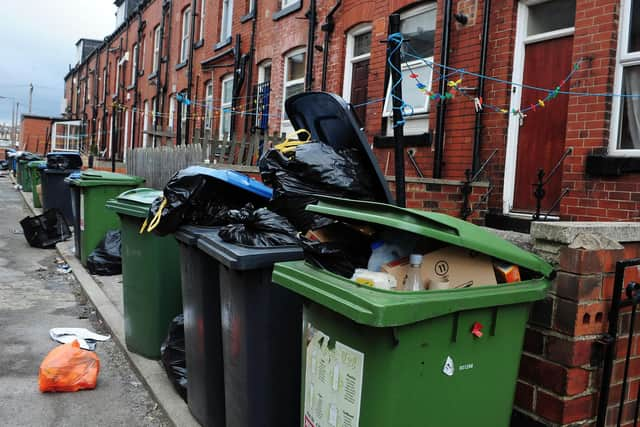The solution to the problem of refuse collection lies underground - Sir Andrew Cook
So why in this age of high-tech electronics and environmental concern do we allow our streets to be routinely disfigured by the multiple bags of rubbish littering our pavements and the serried ranks of plastic bins provided for its collection? They pollute our streets and contaminate our environment. Surely there’s a better way to rid ourselves of this affront to civilised living?
Well, there is. The answer is to make it easier for the rubbish producer – the urban resident – and the rubbish collector – the council – to deposit, segregate and dispose of our household waste.
Advertisement
Hide AdAdvertisement
Hide AdMost households are eager to segregate their rubbish to assist recycling, but to encourage this it needs to be made easy. Fundamentally, almost everyone would like to do away with the weekly parade of the wheelie-bins, cluttering the pavements and disfiguring the streets, and confine their residual domestic rubbish to a single container in their kitchen or back yard.


Already, surveys show that three-quarters of households would like to see more kerbside glass recycling and bottle banks. Increasing collection would be prohibitively expensive and trekking to a bottle bank in the car park of the nearest supermarket is not always straightforward. Besides, there are other items which invite segregation, paper and cardboard for one and PET (the stuff from which most plastic bottles are made) for another. Aluminium drinks cans and even batteries are also desirable segregation candidates. But the key is to make segregation easy and convenient. If we are expected to recycle, conveniently close facilities must be provided for but all the major segregable items.
Otherwise we’ll just stuff everything into a green plastic bin and jam the lid down as best we can: which is what generally happens, with the resulting contamination.
That ubiquitous plastic bin on wheels usually relies on the local council to collect it (in a heavy, diesel-powered bin lorry in many places). There are scores, maybe hundreds of households in each street. With hundreds of streets in a city the size of Leeds, that’s an awful lot of bins to collect and empty, requiring a lot of men and a lot of time. “Will the bin men come today or tomorrow, or this week, or ever?” is a fair question, irrespective of disputes between dustmen and their employers, and given the huge numbers of bins to collect.
Advertisement
Hide AdAdvertisement
Hide AdAll the while the bins remain unemptied, more rubbish is stuffed in until they overflow, the urban foxes feast and the visual pollution gets worse.
Other countries have found a solution to this problem. In Switzerland, recycling points exist within easy walking distance of every urban residence.
A couple of hundred yards from your front door you will find set back from the road and protruding from the ground a cluster of chutes, colour coded and marked ‘glass’, ‘paper’, ‘PET’, ‘general rubbish’ and so on.
The chutes are at street level and beneath each is a large pit, plated over and containing a huge fabric sack. Once a week in the middle of the night, a quiet, purpose-built hybrid lorry with a crane known as a ‘Hiab’ mounted on the back removes the full sack, takes it away to the recycling centre and leaves a fresh bag in its place. Because it is highly mechanised, few men are required. There is little noise and no disturbance. It’s easy, clean and cheap.
Advertisement
Hide AdAdvertisement
Hide AdFor the residual waste which can’t be segregated the resident is expected to use specially-marked plastic bags deposited down their own dedicated chute at the recycling point in exactly the same way as the recyclable stuff.
How often do we curse the council for digging up the road, often needlessly? Well, for once here’s a good reason for those hated holes. Select your rubbish segregation points and start digging.
And my message to you councillors is twofold. Cast your minds back to the great, late-Victorian era of British local government, when the two-tier aldermanic system produced some really inspired civic leaders. Without their vision and determination, there would have been no fine parks, public libraries, hospitals and local transport networks.
Unconcerned with transient political whims, they worked tirelessly to improve the quality of life which their cities offered its citizens. It required leadership, imagination and resolve.
Advertisement
Hide AdAdvertisement
Hide AdSo face up to your responsibilities, brace yourselves to your tasks and do something really useful for once. Don’t let your council functionaries tell you there’s not enough space. Room can always be found beneath those roads they are so fond of digging up.
Sir Andrew Cook is a British industrialist.
Comment Guidelines
National World encourages reader discussion on our stories. User feedback, insights and back-and-forth exchanges add a rich layer of context to reporting. Please review our Community Guidelines before commenting.